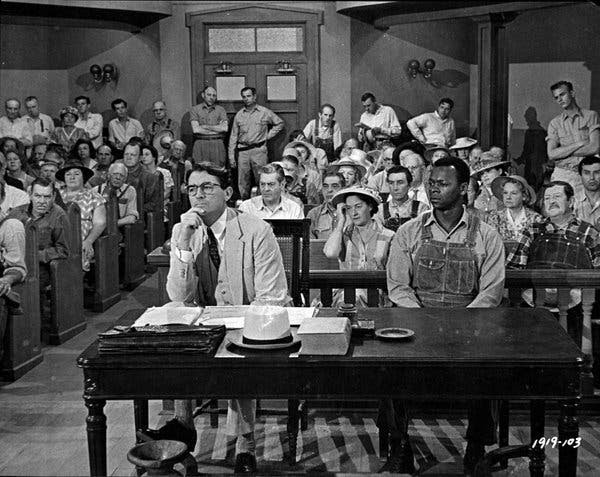
There’s a terrific moment in the To Kill a Mockingbird trial in which Judge Taylor says:
There has been a request that this courtroom be cleared of spectators, or at least of women and children, a request that will be denied for the time being. People generally see what they look for, and hear what they listen for, and they have the right to subject their children to it, but I can assure you of one thing: You will receive what you see and hear in silence, or you will leave this courtroom, but you won’t leave it until the whole boiling lot of you come before me on contempt charges. Mr. Ewell, you will keep your testimony within the confines of Christian English usage, if that is possible.
The protective idea that some things are not fit for women and children to hear, that some things are unutterable in court, is not new. It’s interesting to wonder what it is that the court would have been concerned about. For one thing, there’s the potential that inflammatory stuff can skew and bias public opinions in ways that can undermine a fair trial, but that usually applies to pretrial stuff, when a jury hasn’t been impaneled yet; recently, following the Kohberger trial, I listened to a litany of complaints from media personalities who resent the fact that big chunks of the pretrial transcript and motions have been sealed. In that case, it was done to prevent fanning the flames of public opinion and polluting the jury pool. But what about content from the trial itself?
This is the topic of Sanhedrin 56, which blissfully interrupts the crass talk of yesterday’s daf to discuss procedure. We receive a lot of instruction about the use of euphemisms in open court. The mishna says:
בְּכׇל יוֹם דָּנִין אֶת הָעֵדִים בְּכִינּוּי, ״יַכֶּה יוֹסִי אֶת יוֹסִי״. נִגְמַר הַדִּין, לֹא [הָיוּ] הוֹרְגִין בְּכִינּוּי, אֶלָּא מוֹצִיאִין כׇּל אָדָם לַחוּץ. שׁוֹאֲלִין אֶת הַגָּדוֹל שֶׁבֵּינֵיהֶן וְאוֹמֵר לוֹ: ״אֱמוֹר מַה שֶׁשָּׁמַעְתָּ בְּפֵירוּשׁ״. וְהוּא אוֹמֵר, וְהַדַּיָּינִין עוֹמְדִין עַל רַגְלֵיהֶן וְקוֹרְעִין, וְלֹא מְאַחִין. וְהַשֵּׁנִי אוֹמֵר: ״אַף אֲנִי כָּמוֹהוּ״, וְהַשְּׁלִישִׁי אוֹמֵר: ״אַף אֲנִי כָּמוֹהוּ״.
In other words, at a blasphemy trial, when describing what they heard, the witnesses are supposed to use the euphemism Yosei for God, because YOSE and YHVH both have four letters. The court is then emptied, only one witness repeats the explicit stuff, and the others say, “me too,” as not to compound the offense. The judges tear their garments in mourning, to make it performatively clear that the court (and the witness) are not complicit with the blasphemy.
They now turn to discuss the elements of blasphemy: is it merely uttering the name or cursing it. A long intertextual journey proceeds, which riffs off the root נקב, which can mean to punch a hole or to spell out something explicitly. The reliance on the double meaning of the root is pretty ingenious, because the argument then goes like this: you can only punch a hole once–just like you can only utter one version of the explicit divine name–whereas you can curse many times (meaning, the use of נקב is the equivalent of uttering the name). But then, another sage says, but you could use two different sacred names – it’s like repeated punching. Another principle of interpretive logic is that the biblical text says, “oust the curser” (הוֹצֵא אֶת הַמְקַלֵּל), rather than “oust the utterer and the curser” (הוֹצֵא אֶת הַנֹּקֵב וְהַמְקַלֵּל), implying that in this context נקב and קלל mean the same thing.
Then, they address something I would have never thought would be an issue: whether non-Jews can also be criminally prosecuted for blasphemy. My two cents: this makes no sense! It’s not their god! But the sages are preoccupied with the fact that many biblical sources use the term אִישׁ (man) in a universal sense, to apply to any person of any religion or ethnicity. Rabbi Miyasha deduces this principle from the use of the term כַּגֵּר כָּאֶזְרָח (the rule for the foreigner is the same as the rule for the citizen). Rabbi Meir, however, says that this equation only applies to converts, not to foreigners. Interestingly, even those who think that the blasphemy prohibition applies to foreigners, distinguish in terms of the sentence.
Which is a good segue for the rabbis to move on to discuss other obligations that bind people universally, not all Jews – mainly issues stemming from the Seven Mitzvot of the Sons of Noah. The rabbis expound upon, and expand, the reach of these requirements, drawing some boundaries between Jewish specific issues (e.g., the right to wear objects from two types of textile) and universal issues (such as kicking one’s wife out of the house). The distinctions ring a lot like the modern distinctions between mala in se and mala prohibita, except for a universal prohibition on witchcraft, particularly seances and child sacrifice. The argument goes back to Adam, who was under the sole prohibition of refraining from idol worship.
To end on a jovial note, the recently late Yehonatan Geffen has a fantastic novel called Milk Teeth, in which he describes his childhood in the Nahalal village. The opening scene sees the protagonist, a school boy, use the word “Jehovah” in school and being called into the principal’s office, or the teacher’s lounge, where the teachers excitedly discuss his transgression to his face, incessantly repeating, “he said Jehovah! He said Jehovah!” The only secular equivalent I can think of is the person who “replies all” to an email, saying, “please do not reply all.”




No comment yet, add your voice below!